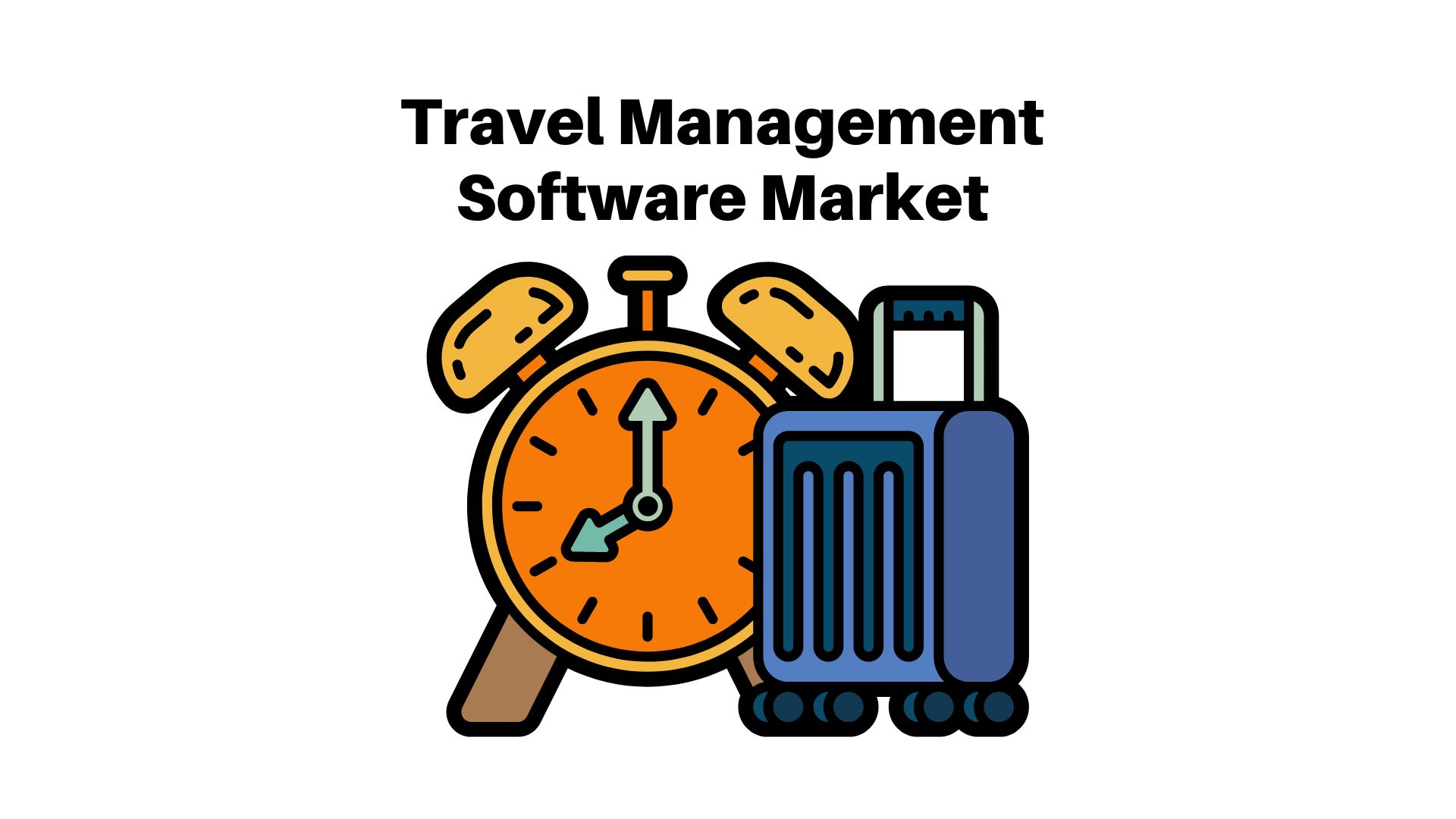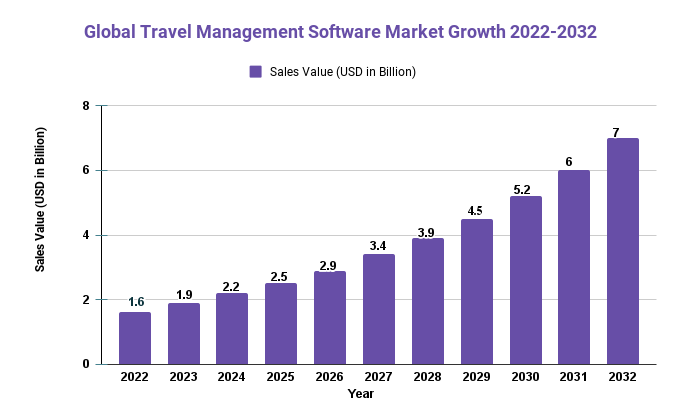Travel Management Software Market Is Forecasted To Reach A Value Of USD 7.0 Bn In 2032

Page Contents
Market Overview
Published Via 11Press: Travel Management Software Market was expected to experience growth over the coming years. While the COVID-19 pandemic caused travel restrictions and health concerns to temporarily reduce demand, as soon as operations returned businesses saw renewed interest in travel management software to assist with managing policies, bookings, expenses, etc.
Global Travel Management Software Market was expected to surge from USD 1.6 Bn in 2022 to USD 7.0 Bn by 2032 at an anticipated compound annual growth rate (CAGR) of 15.8% during its predicted timeframe.
The report identified key growth drivers such as the increasing adoption of cloud-based solutions, the increasing popularity of business travel, and efficient management of travel expenses as key elements for market expansion.
North America was expected to hold the greatest market share, followed by Europe and Asia Pacific. This could be attributable to several leading players present there as well as increasing business travel management software demand within these regions.
Overall, the travel management software market was expected to experience healthy growth over the coming years due to factors including the increasing need for efficient expense management and business travel trendiness; however, current COVID-19 pandemic restrictions may impact this growth further.

Drivers, trends, and challenges have an impact on market dynamics, which can impact businesses. Request for PDF sample report
Key Takeaways
- The global travel management software market was projected to experience compound annual compounded annual compounding of 15.8% between 2022-2032.
- Market growth was anticipated to be driven by factors including the increasing adoption of cloud-based solutions, the need for effective travel expense management, and increasing travel demand among business travelers.
- North America was expected to hold the greatest market share, followed by Europe and Asia Pacific.
- However, the COVID-19 pandemic had an enormously detrimental impact on industry operations; temporary travel restrictions due to health considerations led to reduced travel demand.
Regional Snapshot
- North America was predicted to hold the greatest market share due to several key players within this region and the high business demand for travel management software in these locations.
- Europe was projected to account for the second-highest market share, driven by factors including increasing use of cloud solutions and cost-efficient management of travel expenses, plus rising trendiness of business travel.
- Asia Pacific was expected to experience rapid expansion due to factors like increasing cloud adoption, an upsurge in small and midsized enterprise formation, and travel for business reasons in this region.
- Other regions like Latin America and the Middle East/Africa were expected to experience gradual expansion as a result of factors like increasing technology usage and an upsurge in business travel trends.
Drivers
- Cloud-Based Solutions' Growing Adoption: Due to their increased flexibility, scalability, and cost-efficiency when compared with on-premise solutions, cloud-based travel management software solutions have seen increased adoption within the travel management software market.
- Need for Efficient Travel Expense Management: In an age when businesses seek ways to cut costs and streamline processes, travel management software provides a key solution in effectively handling travel expenses – an increasingly vital market driver.
- Rising Trend of Business Travel: With businesses expanding globally, their demand for travel management software to manage bookings, policies, and expenses has seen a significant increase – driving demand into the market and stimulating its development.
Restraints
- Impact of COVID-19 Pandemic: The COVID-19 pandemic had an immediate, significant effect on travel management software markets; demand dropped temporarily as travel restrictions and health considerations restricted travel plans.
- Security and privacy: Due to travel management software storing employee information that could compromise privacy or security measures, users have raised alarm over its potential effects on the market expansion.
- Limited Adoption among Small and Medium-Sized Enterprises (SMEs): While larger enterprises have quickly taken to travel management software solutions, smaller enterprises (SMEs) have been slower due to factors like cost and lack of awareness – possibly hampering market expansion within this segment.
Opportunities
- The increased popularity of online booking: As online booking grows increasingly prevalent, travel management software providers now have an opportunity to integrate more efficiently with booking platforms to offer businesses an easier travel management experience.
- Integration With Other Business Software: Travel management software can easily integrate with other business solutions like HR management or expense tracking software to offer businesses more comprehensive solutions.
- Emerging Market Adoption Trends: With business travel becoming an ever-increasing part of business activities in emerging markets such as Asia-Pac and Latin America, travel management software providers now have an opportunity to widen their market presence by offering localized solutions that address specific travel problems.
Challenges
- Traditional travel agencies: Because traditional travel agents typically provide personalized customer service and may still have an established clientele base, competition from them could prevent some businesses from adopting travel management software.
- Security and privacy concerns: As mentioned previously, security and privacy concerns present travel management software providers with unique challenges.
- Implementation Challenges: Implementation of travel management software is often complex and time-consuming, requiring considerable resources from various departments and posing numerous implementation hurdles for businesses.
Recent Developments
- SAP Concur launched a new travel management solution, Travel Central, that integrates travel booking, itinerary management, and expense reporting into a single platform.
- Booking Holdings, the parent company of Booking.com, acquired the corporate travel management platform NexTravel, with plans to integrate it into Booking.com's existing travel offerings.
- TravelPerk raised $160 million in funding, bringing the total amount raised to $294 million, as the company continues to expand its global travel management platform.
Key Market Segments
Type
- Cloud-Based
- On-Premise
Application
- Large Enterprises
- SMEs
Key Market Players
- Rydoo
- Juniper
- Bookinglayer
- Clarcity
- Egencia
- SAP
- TravelPerk
- Deem
- TravelBank
- TripActions
- Travelport
Report Scope
| Report Attribute | Details |
| The market size value in 2022 | USD 1.6 Bn |
| Revenue Forecast by 2032 | USD 7.0 Bn |
| Growth Rate | CAGR Of 15.8% |
| Regions Covered | North America, Europe, Asia Pacific, Latin America, and Middle East & Africa, and Rest of the World |
| Historical Years | 2017-2022 |
| Base Year | 2022 |
| Estimated Year | 2023 |
| Short-Term Projection Year | 2028 |
| Long-Term Projected Year | 2032 |
Frequently Asked Questions
Q: What is travel management software?
A: Travel management software is a solution that helps businesses manage their travel policies, bookings, expenses, and other related processes.
Q: What are the benefits of travel management software?
A: Travel management software offers benefits such as increased efficiency, cost savings, streamlined processes, and greater control over travel policies and expenses.
Q: What are the types of travel management software?
A: The types of travel management software include online booking tools, expense management solutions, travel policy management systems, and travel analytics platforms.
Q: What are the challenges in implementing travel management software?
A: Challenges in implementing travel management software include complexity, cost, resistance to change, and ensuring employee adoption and compliance with travel policies.
The team behind market.us, marketresearch.biz, market.biz and more. Our purpose is to keep our customers ahead of the game with regard to the markets. They may fluctuate up or down, but we will help you to stay ahead of the curve in these market fluctuations. Our consistent growth and ability to deliver in-depth analyses and market insight has engaged genuine market players. They have faith in us to offer the data and information they require to make balanced and decisive marketing decisions.